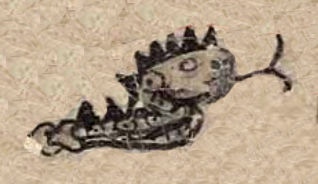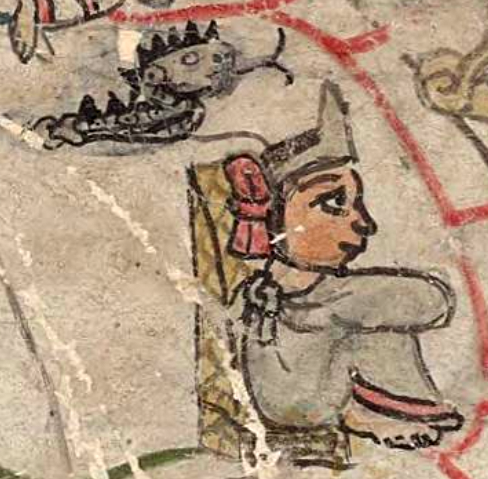Itzcoatl (Mxnus26)
This black-line drawing of the compound glyph for the personal name Itzcoatl (“Obsidian Blade-Serpent,” attested here as a man’s name) shows a serpent in profile facing toward the viewer's right. There is a bend or coil in the body of the animal. Its tongue is bifurcated and protruding, its eye appears to be open, and its body has circles on it that are reminiscent of water droplets or jade beads. Along the top of its head and along its back is a row of obsidian points. A small rattle of two segments appears at the tip of its tail.
Stephanie Wood
Born in 1380, this fourth ruler of Tenochtitlan governed from 1427 to 1440, during which time the Aztec Empire began to emerge and the Nahuas overcame the Tepanecs as the dominant rulers. The chronicler Chimalpahin refers to him several times. See other examples of the glyphic name Itzcoatl below. One of them (from the Matrícula de Huexotzinco) has the same circles on the serpent's body as this one has. The contextualizing image here shows him seated on a woven throne (icpalli) and wearing a cape (tilmatli) and a diadem.
Stephanie Wood
ca. 1590
Jeff Haskett-Wood
obsidiana, piedras, navajas, cuchillos, serpientes, culebras, víboras, serpents, snakes, knives, flints, nombres de hombres, crótalos

Itzcoatl, fourteenth ruler of the Mexica, a person's name (attested male), meaning "Obsidian Snake", https://nahuatl.wired-humanities.org/content/itzcoatl
coa(tl), serpent, snake, https://nahuatl.wired-humanities.org/content/coatl
Serpiente de Navajas de Obsidiana
Stephanie Wood
https://www.loc.gov/resource/gdcwdl.wdl_15284/?sp=26&st=image. This image is hosted by the Library of Congress and the World Digital Library, but the manuscript is part of the holdings of Bibliothèque nationale de France and the original source is gallica.bnf.fr/BNF.
The non-commercial reuse of images from the Bibliothèque nationale de France is free as long as the user is in compliance with the legislation in force and provides the citation: “Source gallica.bnf.fr / Bibliothèque nationale de France” or “Source gallica.bnf.fr / BnF.”







